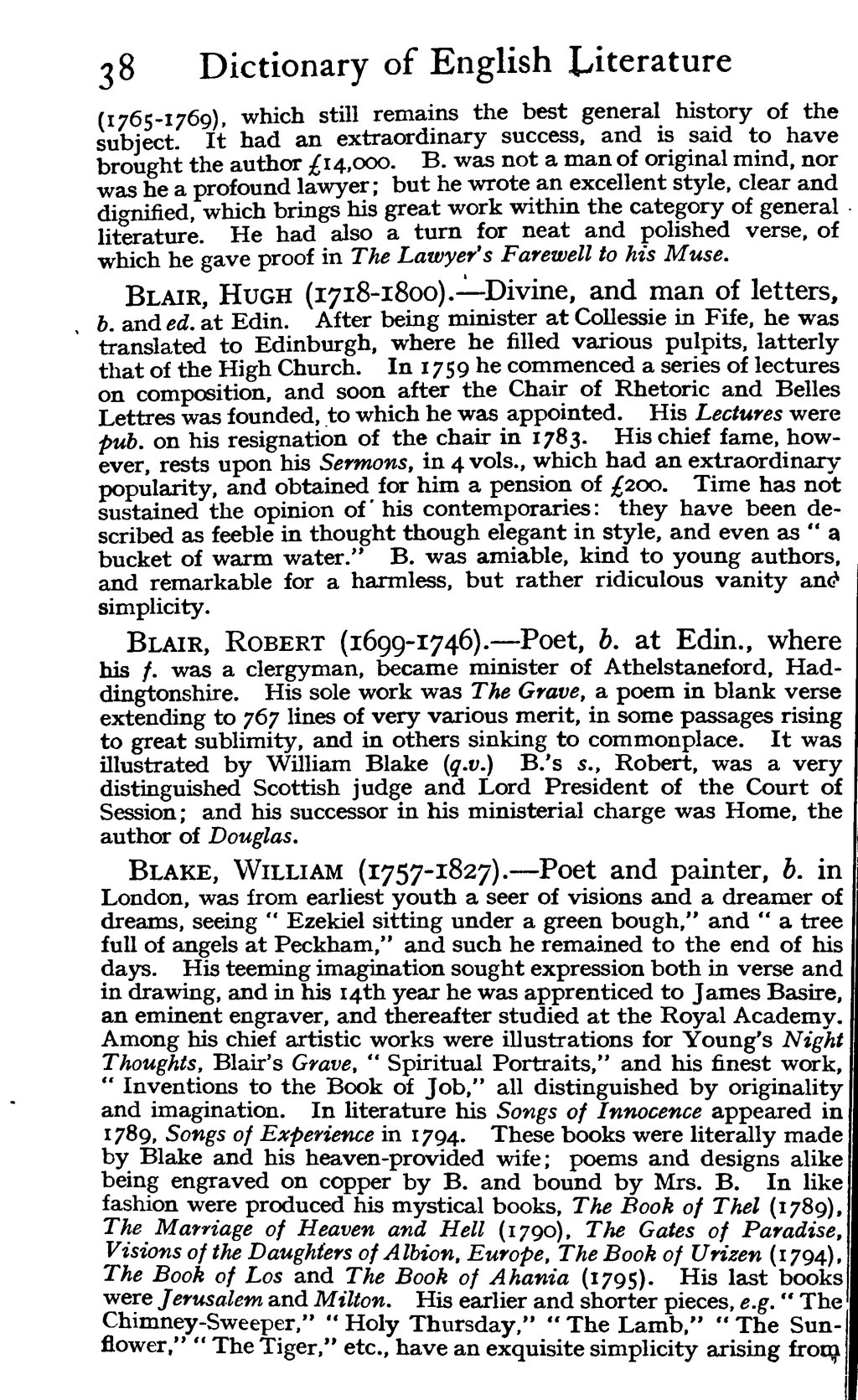(1765-1769), which still remains the best general history of the subject. It had an extraordinary success, and is said to have brought the author £14,000. B. was not a man of original mind, nor was he a profound lawyer; but he wrote an excellent style, clear and dignified, which brings his great work within the category of general literature. He had also a turn for neat and polished verse, of which he gave proof in The Lawyer's Farewell to his Muse.
Blair, Hugh (1718-1800).—Divine, and man of letters, b. and ed. at Edin. After being minister at Collessie in Fife, he was translated to Edinburgh, where he filled various pulpits, latterly that of the High Church. In 1759 he commenced a series of lectures on composition, and soon after the Chair of Rhetoric and Belles Lettres was founded, to which he was appointed. His Lectures were pub. on his resignation of the chair in 1783. His chief fame, however, rests upon his Sermons, in 4 vols., which had an extraordinary popularity, and obtained for him a pension of £200. Time has not sustained the opinion of his contemporaries: they have been described as feeble in thought though elegant in style, and even as "a bucket of warm water." B. was amiable, kind to young authors, and remarkable for a harmless, but rather ridiculous vanity and simplicity.
Blair, Robert (1699-1746).— Poet, b. at Edin., where his f. was a clergyman, became minister of Athelstaneford, Haddingtonshire. His sole work was The Grave, a poem in blank verse extending to 767 lines of very various merit, in some passages rising to great sublimity, and in others sinking to commonplace. It was illustrated by William Blake (q.v.) B.'s s., Robert, was a very distinguished Scottish judge and Lord President of the Court of Session; and his successor in his ministerial charge was Home, the author of Douglas.
Blake, William (1757-1827).— Poet and painter, b. in London, was from earliest youth a seer of visions and a dreamer of dreams, seeing "Ezekiel sitting under a green bough," and "a tree full of angels at Peckham," and such he remained to the end of his days. His teeming imagination sought expression both in verse and in drawing, and in his 14th year he was apprenticed to James Basire, an eminent engraver, and thereafter studied at the Royal Academy. Among his chief artistic works were illustrations for Young's Night Thoughts, Blair's Grave, "Spiritual Portraits," and his finest work, "Inventions to the Book of Job," all distinguished by originality and imagination. In literature his Songs of Innocence appeared in 1789, Songs of Experience in 1794. These books were literally made by Blake and his heaven-provided wife; poems and designs alike being engraved on copper by B. and bound by Mrs. B. In like fashion were produced his mystical books, The Book of Thel (1789), The Marriage of Heaven and Hell (1790), The Gates of Paradise, Visions of the Daughters of Albion, Europe, The Book of Urizen (1794), The Book of Los and The Book of Ahania (1795). His last books were Jerusalem and Milton. His earlier and shorter pieces, e.g. "The Chimney-Sweeper," "Holy Thursday," "The Lamb," "The Sun-flower," "The Tiger," etc., have an exquisite simplicity arising from

